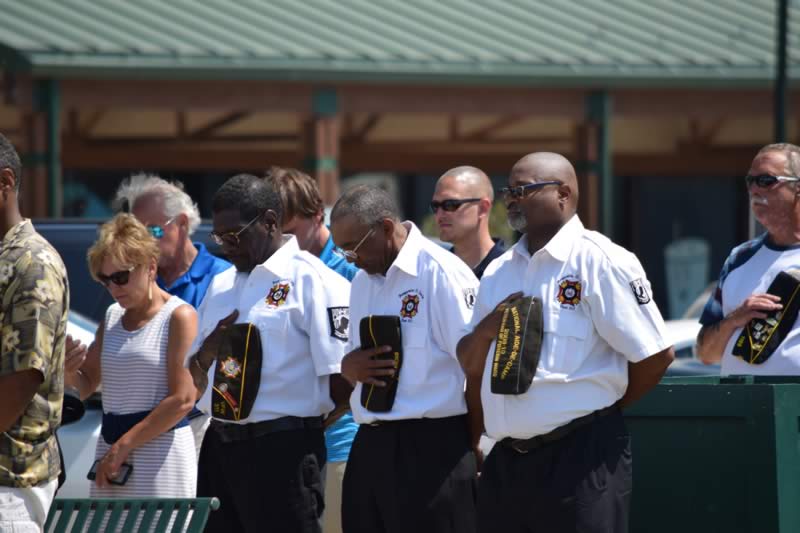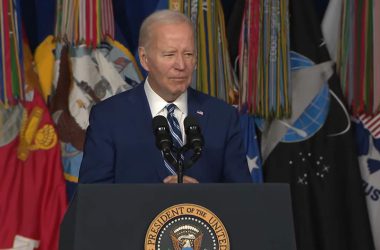Washington, DC–(ENEWSPF)–September 18, 2014.
Chairman McKeon, Ranking Member Smith, members of the committee, I very much appreciate the opportunity this morning to discuss the President’s strategy to degrade and ultimately destroy ISIL.
Mr. Chairman, on a personal note, I want to thank you for your leadership on yesterday’s vote. I believe, the President believes the vote was a very important and defining vote, and we are not unmindful of the work that you and others on this committee invested in that vote and getting a turnout, but you did. So thank you.
Yesterday, I joined President Obama at MacDill Air Force Base in Tampa, where he received a briefing from the commander of U.S. Central Command, General Austin, on operational plans to implement our ISIL strategy and met with representatives, while I was there, as did the President, from more than 40 partner nations.
I’m joined here today, as you have noted, Mr. Chairman, by the Joint Staff’s Director for Operations, Lieutenant General Bill Mayville. He is our “J-3,” and General Mayville helps oversee, among many of his responsibilities, our military operations in Iraq, the Middle East and in CENTCOM and works closely with General Austin in CENTCOM to develop all of our military plans. So I appreciate very much General Mayville being here.
And as you noted, Mr. Chairman, Chairman Dempsey is with our partners internationally over the next few days, and as you noted, he should be. Much of that discussion will be about the Middle East, specifically Iraq and Syria. He consults with our allies in this fight against ISIL and tomorrow, will attend a special NATO Chiefs of Defense conference in Lithuania, where they will be focused on the ISIL challenge.
The Defense Department civilian and military leaders, Mr. Chairman, are in complete agreement with every component of the President’s strategy, and we strongly believe it offers the best opportunity to degrade and destroy ISIL. The President, Chairman Dempsey, General Austin and I are in full alignment on all of our objectives and our tactics and our strategy, that military strategy necessary to achieve the President’s objective.
However, as President Obama has repeatedly made clear, American military power alone cannot eradicate the threats posed by ISIL to the United States, our allies and our friends and partners in the region. Iraq’s continued political progress toward a more inclusive and representative government will be critical to achieving our objective. We believe that Iraq’s new Prime Minister is committed to bringing all Iraqis together against ISIL. To support him and the Iraqi people in their fight against ISIL, against terrorists the special coalition that we are assembling will need to use all of its instruments of power — military, law enforcement, economic, diplomatic and intelligence — in coordination with the countries in the region.
To succeed, this strategy will also require a strong partnership between the executive branch and Congress. The President has made it a priority to consult with congressional leadership on the ISIL challenge, as have Vice President Biden, Secretary Kerry and many senior members of the administration. I appreciate the opportunities I’ve had to discuss our strategy with members of this committee, including you, Mr. Chairman, and other members of the Senate and the House over the last couple of weeks, and we’ll continue with these consultations.
ISIL poses a real threat to all countries in the Middle East, our European allies and to America, as you have noted, Mr. Chairman, as has Congressman Smith.
In the last few months, the world has seen ISIL’s barbarity up close as its fighters advanced across western and northern Iraq and slaughtered thousands of innocent civilians, including Sunni and Shia Muslims and Kurdish Iraqis and all religious minorities who stood in their way. ISIL’s murder of two U.S. journalists outraged the American people and exposed the depravity of ISIL’s ideology and tactics, exposed those tactics and that brutal ideology to the world. Over the weekend, we saw ISIL’s murder of a British citizen. ISIL now controls a vast swathe of eastern Syria and western and northern Iraq, including towns and cities in these areas.
ISIL has gained strength by exploiting the civil war in Syria and sectarian strife in Iraq. As it has seized territory across both countries and acquired significant resources and advanced weapons, ISIL has employed a violent combination of terrorist, insurgent and conventional military tactics. ISIL has also been very adept at employing technology and social media, employing this to increase its global profile and attract tens of thousands of fighters.
Its goal is to become the new vanguard of the global extremist movement and establish an extremist Islamic caliphate across the Middle East. It considers itself the rightful inheritor of Osama bin Laden’s legacy.
While ISIL clearly poses an immediate threat to American citizens in Iraq and our interests in the Middle East, we also know that thousands of foreign fighters, including Europeans and more than 100 Americans, have traveled to Syria with passports that give them relative freedom of movement these fighters can exploit ISIL’s safe haven to plan, coordinate and carry out attacks against the United States and Europe.
Although the intelligence community has not yet detected specific plotting against the U.S. homeland, ISIL has global aspirations — clearly has global aspirations. And they have so stated. And, as President Obama has made clear, ISIL’s leaders have threatened America and our allies. If left unchecked, ISIL will directly threaten our homeland and our allies.
In his address to the nation last week, President Obama announced that the United States will lead a broad multinational coalition to roll back ISIL’s threat and defeat ISIL.
More than 40 nations have already expressed their willingness to participate in this effort, and more than 30 nations have indicated their readiness to offer military support. President Obama and Vice President Biden, Secretary Kerry and I and others are working to unite and expand this coalition. At the NATO summit in Wales, Secretary Kerry and I convened a meeting of key partners in this coalition. I then went to Georgia and Turkey, as you noted, Mr. Chairman. The Georgians made clear they will help. Turkey, by virtue of its geography and its common interest in destroying ISIL — and I might note an indispensable member of NATO, from the beginning of NATO, we know that Turkey is now in the grips of ISIL holding nearly 50 of its diplomats…
As I was noting, ISIL is currently holding nearly 50 Turkish diplomats hostage. And this obviously is a high and first priority of the Turkish government, to get those hostages back. And in my conversations with President Erdoğan and other leaders in Turkey, we talked specifically about that, but also the important role Turkey will play in our overall efforts in this coalition.
Secretary Kerry convened a meeting in Jeddah last week with foreign ministers from the six Gulf [Cooperation] Council states, also Egypt, Iraq, Jordan, and Lebanon.
And all 22 nations of the Arab League adopted a resolution at their summit in Cairo calling for comprehensive measures to combat ISIL. Earlier this week in Paris, President Hollande of France, who traveled to Iraq last weekend, hosted a conference attended by the U.N. Security Council permanent members, European and Arab leaders, and representatives of the E.U., Arab League and United Nations. They all pledged to help Iraq in the fight against ISIL including through military assistance.
Other key allies, such as Australia, Canada, France and the United Kingdom are already contributing military support. And other partners have begun to make specific offers. At next week’s U.N. General Assembly, we expect that additional nations will be making commitments across a spectrum of capabilities, building on the strong Chapter VII U.N. Security Council resolution adopted last month calling on all member states to take measures to counter ISIL and to suppress the flow of foreign fighters to ISIL. Also next week President Obama will chair a meeting of the U.N. Security Council to further mobilize the international community.
As you all know, former International Security Assistance Force commander and acting CENTCOM commander, General John Allen, has been designated serve as Special Presidential Envoy for the Global Coalition to Counter ISIL. General Allen will work in a civilian diplomatic capacity to coordinate, build and sustain the coalition, drawing on his extensive experience in the Middle East. He will work closely with General Austin of CENTCOM to ensure that coalition efforts are aligned across all elements of our strategy.
In his address to the nation, the President outlined the four elements of this strategy to degrade and ultimately destroy ISIL. Let me now describe how we are implementing this whole-of-government approach.
First, in close coordination with the new Iraqi government, we are broadening our air campaign against ISIL targets to protect Americans threatened by ISIL and advances that ISIL is making, and also to prevent humanitarian catastrophe, the U.S. military has already conducted more than 170 successful airstrikes.
These strikes have disrupted ISIL tactically and helped buy time for the Iraqi government to form an inclusive and broad-based governing coalition led by the new Prime Minister. That was one of President Obama’s essential preconditions for taking further action against ISIL, because the Iraqi people, the Iraqi people, must be united in their opposition to ISIL in order to defeat them. This is ultimately their fight.
The new broader air campaign against ISIL targets will enable Iraqi security forces including Kurdish forces to continue to stay on the offensive and recapture territory from ISIL and hold it.
The President of the United States has the constitutional and the statutory authority to use military force against ISIL in Syria as well as Iraq. Because ISIL operates freely across the Iraqi/Syrian border and maintains a safe haven in Syria, our actions will not be restrained by a border that exists in name only.
CENTCOM’s plan includes targeted actions against ISIL safe havens in Syria, including its command-and-control, logistics capabilities and infrastructure. General Dempsey and I have both approved and spent considerable time reviewing and adapting the CENTCOM plan which General Austin, as I noted, briefed to the President in Tampa yesterday.
The second element of the strategy is to increase our support for forces fighting ISIL on the ground. Not American forces, but forces, Iraqi forces, fighting on the ground.
To support Iraqi and Kurdish forces, the President announced last week that we would deploy an additional 475 American troops to Iraq.
Part of that number includes approximately 150 advisers and support personnel to supplement forces already in Iraq conducting assessments of the Iraqi security forces. This assessment mission is now transitioning to an advise-and-assist mission with more than 15 teams embedding with Iraqi security forces at the headquarters level to provide strategic and operational advice and assistance.
By the time all these forces arrive, there will be approximately 1,600 U.S. personnel in Iraq responding to the ISIL threat. But, as the President reaffirmed yesterday in Tampa, American forces will not have a combat mission on the ground.
Instead, these advisers will continue to support Iraqi and Kurdish forces, including the government’s plans to stand up Iraqi National Guard units. These units are to help Sunni communities defeat ISIL in their area.
The best counterweights to ISIL are local forces and local citizens, the people. As you know, in June, the President asked Congress for the necessary authority for DOD to train and equip moderate Syria opposition forces, and $500 million to fund this program. And, again, we appreciate yesterday’s House vote to amend the Continuing Resolution with language authorizing this train-and- equip program.
Saudi Arabia will host the training program to this mission. And the Saudis have offered funding and additional assistance with recruiting and vetting.
The $500 million request the President made in June for this train-and-equip program reflects CENTCOM’s estimate of the cost to train, equip and resupply more than 5,000 opposition forces over one year. This is the beginning of a multi-year, scalable effort designed to eventually produce an even larger opposition force.
The package of assistance that we initially provide would consist of small arms, vehicles and basic equipment like communications as well as tactical and more advanced training. As these forces prove their effectiveness on the battlefield, we would be prepared to provide increasingly sophisticated types of assistance to the most trusted commanders and capable forces. The goal is not to achieve numerical parity with ISIL, but to ensure that moderate Syrian forces are superior fighters trained by units. Our goal is to undercut ISIL’s recruitment and to enable the Syrian opposition to add to the pressure ISIL is already facing from the Iraqi security forces and the security forces of Kurdistan. We want to force ISIL into a three-front battle against more capable local forces.
A rigorous vetting process will be critical to the success of this program. DOD will work closely with the State Department, the intelligence community and all of our international partners and in the region to screen and vet the forces we train and equip. We will monitor them closely to ensure that weapons do not fall into the hands of radical elements of the opposition, ISIL, the Syrian regime or other extremist groups. There will always be risks, Mr. Chairman. There are risks in everything. There are risks in action and there are risks in inaction. But we believe the risk is justified, given the real threat ISIL poses to this country and to the region and to our allies and as necessity of having capable partners on the ground in Syria.
As we pursue this program, the United States will continue to press for political resolution to the Syrian conflict. Assad has lost all legitimacy to govern. He has created the conditions that allowed ISIL and other terrorist groups to gain ground and terrorize and slaughter the Syrian population. The United States will not coordinate or cooperate with the Assad regime.
The third element of the President’s strategy is an all- inclusive approach to preventing attacks from ISIL against the homeland of the United States and our allies. In concert with our international partners, the United States will draw on intelligence, law enforcement, diplomatic and economic tools to cut off ISIL’s funding, improve our intelligence, strengthen homeland defense and stem the flow of foreign fighters.
The United States and our allies have been stepping up efforts to identify encounter threats emanating from Syria against our homelands. This includes increased intelligence sharing, working with DOD’s partners at the National Counterterrorism Center, the Department of Homeland Security, the FBI, and across the intelligence community our terrorist screening and analytical databases now have special threat cases linking together known actors and potential foreign fighters, making it easier and faster to update them regularly with new information. Department of Homeland Security Secretary Jeh Johnson has directed enhanced screening at 25 overseas airports with direct flights to the United States, a step that the United Kingdom and other countries have already taken.
The Departments of Justice and Homeland Security have launched an initiative to partner with local communities to counter extremist recruiting, and the Department of Treasury’s Office of Terrorism and Financial Intelligence is working closely with coalition partners to disrupt ISIL’s financing and expose their financing activities.
The final element of the President’s strategy is to continue providing humanitarian assistance to innocent civilians displaced or threatened by ISIL.
Alongside the government of Iraq, the United Kingdom, Canada, Australia, France, U.S. troops have already delivered life-saving and thousands of threatened Iraqi civilians on Mt. Sinjar in the Iraqi town of Amirli.
Our total humanitarian assistance to displaced Iraqis is now more than $186 million for fiscal year 2014.
The United States is also the single largest donor of humanitarian assistance for the millions of Syrians affected by the civil war. Since the start of the Syrian conflict, the United States has committed almost $3 billion in humanitarian assistance to those affected by this war.
All four elements of this strategy require a significant commitment of resources on the part of the United States and our coalition partners.
This effort will not be easy; this effort will not be brief; this effort will not be simple. We are at war with ISIL, just as we are at war with Al Qaeda. But destroying ISIL will require more than military efforts alone…it will require political progress in the region and effective partners on the ground in Iraq and in Syria. And as President Obama said yesterday in Tampa, “we cannot do for the Iraqis what they must do for themselves… we can’t do it for them, but this is an effort that calls on America’s unique abilities – and responsibilities – to lead.”
As the Congress and the administration work together, we know this effort will take time. The President has outlined a clear, a comprehensive and a workable strategy to achieve our goals and protect our interests. Mr. Chairman, members of this committee, thank you, thank you for your continued support, your partnership and what you do for our men and women in uniform who protect this country.
Thank you.
Source: defense.gov








